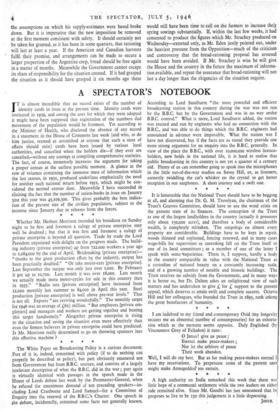The White Paper on Broadcasting Policy is a curious document.
Part of it is, indeed, concerned with policy (if to do nothing can properly be described as policy), but part obviously emanated not from Government but from B.B.C. sources, and consists of a largely irrelevant description of what the B.B.C. did in the war ; part again is virtually identical with passages in the speech made in the House of Lords debate last week by the Postmaster-General, when be refused the unanimous demand of ten preceding speakers—in- cluding Lord Cranborne and Lord Samuel—for a Committee of Enquiry into the renewal of the B.B.C.'s Charter. One speech in the debate, incidentally, contained some facts not generally known.
According to Lord Sandhurst " the most powerful and efficient broadcasting station in thia country during the war was not run by the B.B.C. but by the Government and was in no way under B.B.C. control." What is more, Lord Sandhurst added, the station was erected and run by engineers who had no connection with the B.B.C., and was able to do things which the B.B.C. engineers had announced in advance were impossible, What the station was I have not discovered, but if the facts are as stated they provide one more strong argument for an enquiry-into the B.B.C. generally. In view of the place the B.B.C., with over to,000,000 wireless licence- holders, now holds in the national life, it is hard to realise that public broadcasting in this country is not yet a quarter of a century old. Plenty of us can remember going to speak into the microphones in the little out-of-the-way studios on Savoy Hill, or, as listeners, earnestly twiddling the cat's whisker on the crystal to get better reception in our earphones. A short journey and a swift one.
* * * *


























 Previous page
Previous page